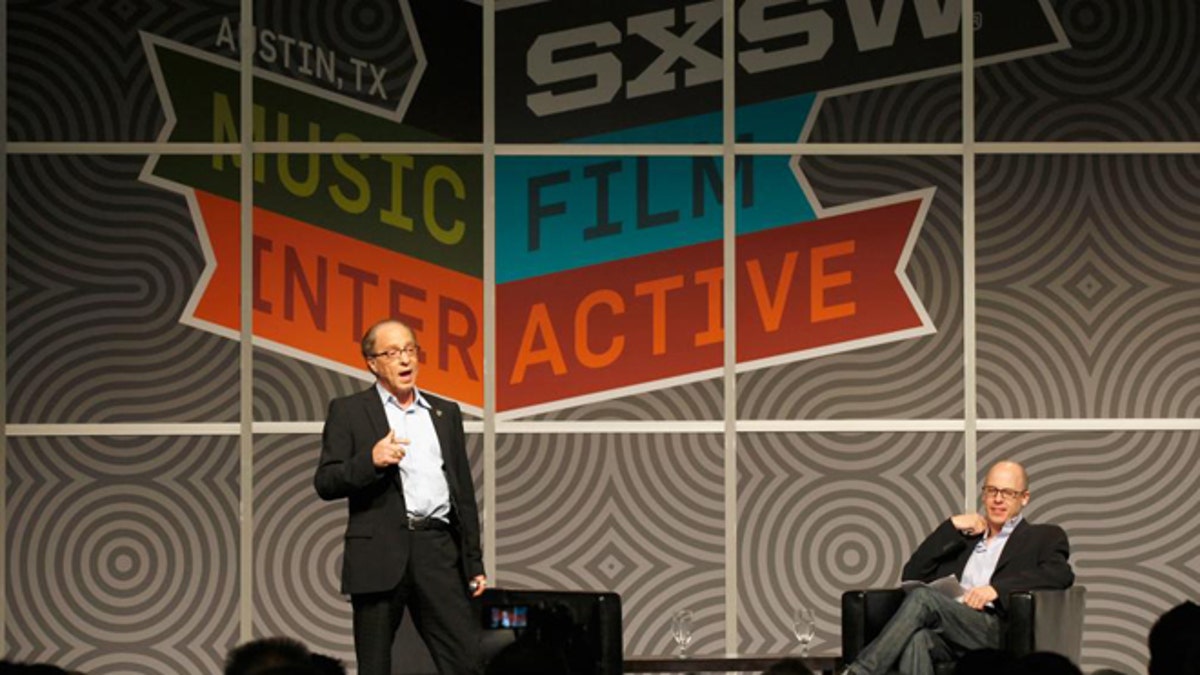
Ray Kurzweil and Sean Mathis, seen at the 2012 SXSWi show in Austin, Texas. (Sean Mathis / SXSW)
Like the great bluesmen Robert Johnson and Eric Clapton, South By Southwest is at a crossroads.
To the left: The music and technology conference's history in low-key Austin, Texas, where you-can't-really-call-them-startups-anymore like Twitter and Foursquare started up. To the right: the glitz and glamour of Las Vegas, where the festival will host a second, summer edition for the first time later this year.
And for miles in front and back, small startups trying to be heard. Good luck.
"It's much harder for the small guys to get heard out here [these days],” John Biggs, the east coast editor at TechCrunch, told FoxNews.com. “So many startups are almost identical that it's not enough to have a cute twist on an old idea anymore. No one can take on, say, Facebook, and survive."
SXSWi has come a long way, Biggs said, and not just its coming physical proximity to Blackjack tables. But can the show itself survive?
In past years, SXSWi, which runs March 8 to 12 in Austin, served as a showcase for brands with big ideas and perhaps not-so-big budgets. An intimate setting where word travelled fast, and conversations between entrepreneurs, investors, and the media were heavily lubricated by Lone Star beers and Austin's innate casualness. It wasn't unreasonable to think that a small team -- perhaps sharing cramped quarters in a single hotel room -- could put in enough hours at the panel and party circuit to get some serious attention from the conference's ridiculous density of early adopters and members of the media.
"Traction," as business types call it.
Eventually, patterns emerged. Annual festivals became known for serving as battle royales for categories of companies. In 2010, it was all about location-based check-in services such as Foursquare and Gowolla (if you don't remember that one, it's because Foursquare won the war). In 2011, group-messaging services such as GroupMe, Fast Society, and Beluga fought it out. Last year, the buzz was on "ambient discovery" apps like Highlight and Sonar, which show you people or things going on around you.
If these categories seem progressively more niche, that's because they are. Every year, the presumption that these category-wide battles would actually infiltrate mainstream culture became harder and harder to swallow. People paid attention, perhaps because of the media's inclination and job to draw together narratives and digest the news, but the chances are pretty slim that your cousin and mother are now using Highlight or Sonar on a daily basis.
This year, it's easy enough to pinpoint specific startup trends that are on display at the festival: There are no shortage of cab-hailing apps (Uber's the biggest) and video-sharing services (check out Vine and Montaj if you haven’t yet), but it's hard to make the argument that the festival is serving as the coming-out party for ... well, anything.
There are no huge launches and few major updates timed to the festival.
"The biggest change in SXSWi is that the impetus has changed from being on designers, developers and apps, and shifted more towards marketers, brands and influencers," said Christina Warren, senior tech analyst at Mashable. In other words: It's become less a place to show off new inventions, and more a way to seed the culture with ones that already exist.
Companies simply don't come to SXSWi to show off new products anymore; they come here to party and to network. Unlike just about every conference ever, SXSWi has a reputation for being insanely fun, and even a little hip. And where hipness exists, it's only a matter of time before massive companies flood the streets with massive marketing budgets. The result: Amid the din of blowout parties and celebrity appearances and performances, it's harder than ever for small guys to get noticed.
But without real innovation and news to serve as a hook to draw people in, there's a real risk SXSWi will simply become too big -- and vacuous -- for its own good. Blow-out parties from big companies are fine, but it's the little guys that turned the festival into what it is today. And if they are drowned out, it's hard to predict where the festival will fit into the cultural landscape in coming years.
"SXSWi has shifted in a real way," says Erica Berger, director at Storyful and a media creative. "One question remains -- will SXSW be worth it next year, or is SXSW 2013 the Coachella of 2011?"
So like the blues classic, SXSW is at a crossroads.
Will it soon feel it’s sinking down?








































